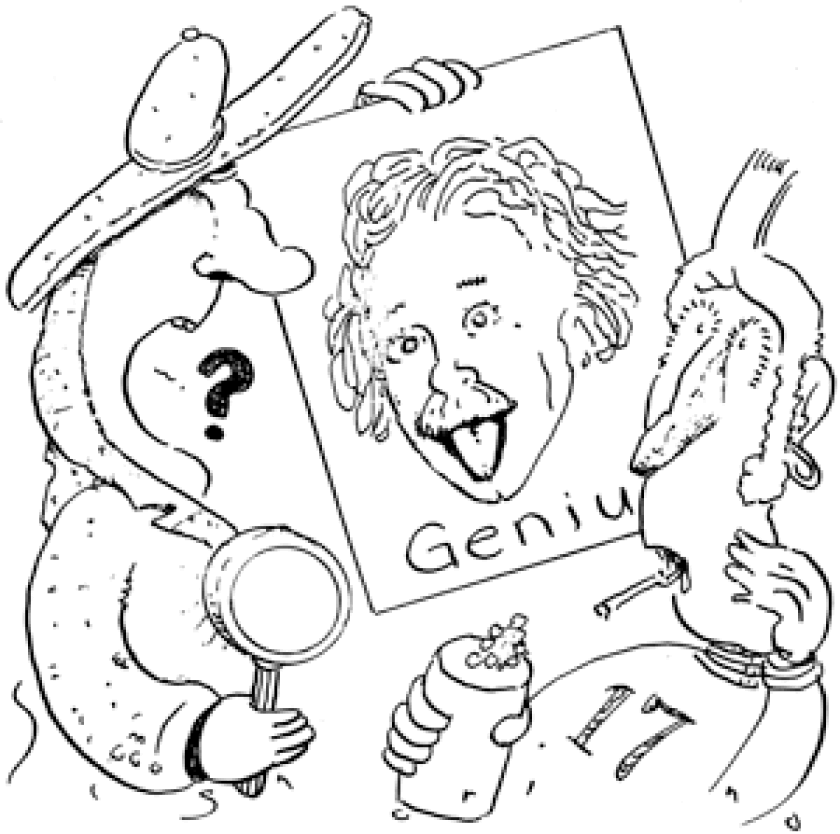Dear Cecil: Do supergeniuses still exist? The world has more people, so there should be more Newtons and Einsteins than ever, but I can’t think of many today like that. Wesley Clark, via the Straight Dope Message Board
Cecil replies:
Wesley, honestly. Have you never heard of Stephen Hawking? He’d rank high on any list of supergeniuses. And of course there can be only one superdupergenius, namely me.
Still, times being what they are, I can appreciate wanting more depth on the supergenius bench. To understand why the breed is rare, let’s look at supergeniuses of the past. Newton and Einstein were geniuses pretty much by acclaim, up there with other favorites like Shakespeare, Galileo, and Beethoven. And how about Charles Darwin? He basically created our modern understanding of evolution — giving us, in natural selection, a sui generis theory that could only have issued from a singular mind. Right?
Well, no. Another guy came up with roughly the same idea, independently of Darwin, around the same time; the two subsequently co-published a paper. But despite some latter-day attempts to correct the historical record, few today have heard of poor Alfred Russel Wallace. Darwin, moreover, was by his own account no great thinker. The insights for which he’s known are surely genius, but the man himself? Frankly unimpressive. As a 2009 article in Genetics put it, “In his style and from what we can deduce of his mental processes, he does not fit the image of ‘genius’ that we have inherited from physics and mathematics.”
What I’m getting at is that whatever we’re calling “genius” is a blurry concept that comprises not just smarts but creativity, timing, and star-making PR. In its original formulation, genius was thought by the ancient Romans to be a unique talent everyone was born with. More recently, IQ testing has led it to be associated with quantifiable intelligence, though of course one doesn’t guarantee the other. Just ask William James Sidis, once considered by some the smartest man ever. (I wasn’t born yet.) Sidis, who went to Harvard at age 11, produced no great work and died in obscurity in 1944, at 46.
Einstein was the complete package: a high-IQ fellow who was exceptionally creative and productive — famously, in a single year he produced four papers that changed physics forever. You’ve stumbled, actually, on a point of some anxiety in the sciences today, where future Einsteins aren’t assured. Why not? A few ideas:
The disciplines are settled. The supergeniuses we recognize today created their fields (Galileo) or revolutionized them (Einstein). Psychologist Dean Keith Simonton argues that for a century no disciplines have been created wholesale, but rather combined with existing fields into hybrid forms: astrophysics, biochemistry. “It is difficult to imagine that scientists have overlooked some phenomenon worthy of its own discipline,” Simonton writes. “Future advances are likely to build on what is already known rather than alter the foundations of knowledge.”
It takes more work to do that building. The lower-hanging fruit having been picked, would-be supergeniuses now must spend more time acquiring the background knowledge needed to make higher-order discoveries. A 2005 study of noted inventors and Nobel laureates found the mean age for making significant discoveries had increased six years over a century.
The implications of today’s discoveries are more abstruse and so get less public exposure. Einstein’s work led to the atom bomb. Today, consider the Higgs boson, the so-called god particle — key to understanding the universe. Incredible stuff? Yes. Immediately consequential? No.
Science today demands teamwork. One guy theorized the existence of the Higgs, but it took thousands of very smart people — not to mention a series of increasingly enormous particle accelerators — nearly five decades to prove it. As our pursuits get more complex, that’s increasingly what discovery looks like: teams of experts searching doggedly for answers, rather than one big brain flying solo.
And as much as the singular genius has given us, he’s increasingly anachronistic. You’ll notice everyone mentioned here is a white guy, a trend the lone-genius trope does nothing to disrupt. A recent poll of 2,000 academics found that fields where scholars explicitly equated success with brilliance (rather than, say, hard work; philosophy being the egregious example) conferred PhDs on far fewer women and people of color than fields (like psychology) in which respondents were less hung up on sheer intellect. Another survey asked subjects (civilians, not profs) to rate the impressiveness of discoveries described as either having occurred “like a light bulb” or having been “nurtured like seeds.” The participants considered light-bulb-type ideas more impressive unless the discovery was made by a woman, in which case nurturing scored higher.
The way the authors see it, these results comport with “gendered stereotypes of genius as male” — we expect men to have the classic “Eureka!” breakthroughs, with women seen as better off tending their little intellectual gardens. But such biases aren’t advancing the overall enterprise of discovery. Supergeniuses, then, may be on their way out, but we’ll make do without them — in fact the towering intellects of legend may not be particularly well suited to the present day.
Most, anyways. I’ve got no plans to retire.
Cecil Adams
Send questions to Cecil via cecil@straightdope.com.
